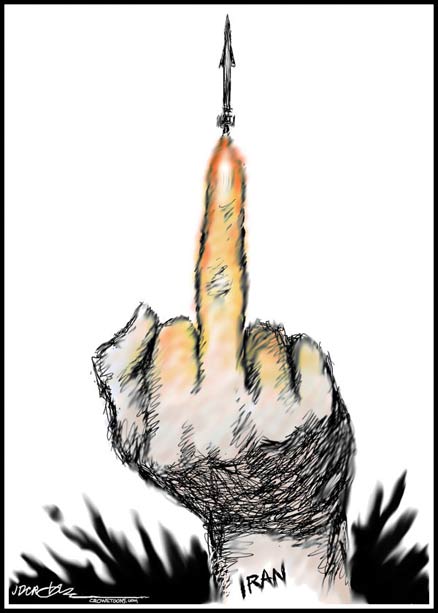
That's why the Iranian government's attacks and threats on the Foundation for Defense of Democracies (FDD), a U.S. think tank, are so dangerous.
Last Saturday, the Iranian Foreign Ministry announced it was sanctioning FDD and its executive director Mark Dubowitz, calling them instrumental in propagating "unilateral and illegal economic terrorism . . . imposed by the ruling regime" in Washington. According to Tehran, FDD stands accused of "designing, imposing and intensifying" the Trump administration's economic sanctions on Iran.
The Foreign Ministry statement also said it would consider legitimate "any further legal measures that the other administrative, judicial or security institutions and organizations may take in order to counter, prosecute or punish" FDD or Dubowitz or their "collaborators and accomplices."
FDD and the U.S. government are taking that as a direct threat against Americans by a regime with decades of history violently harming its critics abroad, through assassinations and terrorism. Secretary of State Mike Pompeo tweeted that the U.S. government does not take these threats lightly and will hold the regime to account.
Dubowitz told me FDD has been dealing with the FBI, which is also taking the threats seriously, while he and the organization boost their security. "We are hardening our defenses so we can redouble our efforts against this odious regime," he said. "We are not backing down."
In a rare moment of bipartisan unity in Washington, 70 top think-tank scholars from across the ideological spectrum signed an open letter of support for FDD. The scholars argue the Iranian regime's actions constitute an assault on all experts who dare to not toe a repressive regime's official line.
"This Iranian threat against one think tank is a threat against all researchers and academics, and that's why in a short space of time we were able to gather people across the full range of the political spectrum," said Danielle Pletka, senior vice president of foreign and defense policy studies at the American Enterprise Institute, who organized the letter.
Among the signers are some prominent critics of the Trump administration's Iran policy, including former deputy secretary of state Antony Blinken, Center for American Progress senior fellow Brian Katulis and former senior Obama-era National Security Council official Robert Malley, who is close to Iranian Foreign Minister Mohammad Javad Zarif and met with him recently in New York.
"This is a further example of a troubling trend whereby governments attempt to stifle and intimidate independent researchers; colleagues of ours have been targeted by several countries in a variety of ways, from harassment to denial of access to expulsion to imprisonment," the letter states. ". . . The leadership in Tehran should understand that these actions redound solely to their own discredit."
The letter notes that the various scholars who signed disagree on Iran policy and some intellectually oppose what FDD is doing. "On this matter, however, we stand together in condemning attempts to intimidate a non-governmental organization and its staff," the letter states.
The Trump administration imposed sanctions on Zarif last month as part of its escalating "maximum pressure" campaign. Some in Washington think that in light of these threats against FDD, Zarif should be shunned when he visits New York next month to attend the U.N. General Assembly. Suzanne Maloney, a senior fellow at the Brookings Institution, said on Twitter that given Iran's growing practice of detaining foreigners on bogus chargers, including several academics, "all academic [and] research organizations should seriously reassess their engagement" with Iranian government institutions.
So far, the Iranian government has not gotten the message. On Thursday, Iranian Foreign Ministry spokesman Abbas Mousavi issued a statement saying Iran will soon release a list of people from several countries who are to be sanctioned for working with FDD.
"Iran does not consider this foundation a think-tank; rather, it is an organization working under the cover of a think-tank," the statement said, adding, "This foundation is in fact the designing and executing arm of the U.S. administration, and the U.S. carries out most of its hostile measures against the Iranian nation based on the designs of this institution."
FDD is not an arm of the U.S. government. Repressive regimes in un-free countries can't accept that in free societies, independent thinkers are allowed try to influence government policy. In closed societies, such a system might lead to independent thinkers challenging official narratives.
But Iran's attempts to export its repression to our free research environment cannot be allowed. Otherwise, the repressive regimes in Russia, China, Saudi Arabia and elsewhere will come to believe they can intimidate Americans into silence, as they do to their own people.
Sign up for the daily JWR update. It's free. Just click here.
(COMMENT, BELOW)


 Contact The Editor
Contact The Editor
 Articles By This Author
Articles By This Author